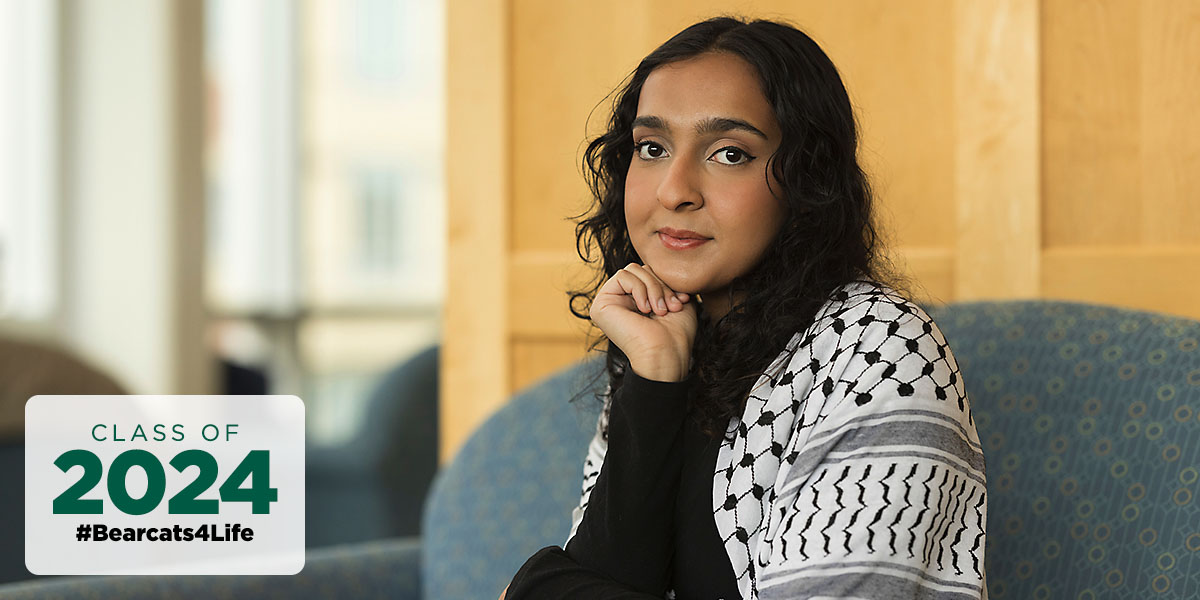Fieldwork: One of Harpur’s first grads in global public health conducts research in Ghana
Yasmeen Gilani plans to pursue her passion for addressing inequities in maternal health

Yasmeen Gilani’s senior year in high school was anything but typical. Sequestered at home due to the coronavirus pandemic, the New Hyde Park native watched the Black Lives Matter protest unfold in the news.
“I realized that a lot of the systems that I had thought were protecting and serving people were instead disproportionately impacting marginalized communities, such as low-income communities and communities of color,” Gilani reflected.
The change in perspective shifted her life’s course. When she walks across the stage this May, Yasmeen Gilani will be one of the first graduates of Harpur College’s new program in global public health. A dual major in Africana Studies, she is also part of the Binghamton Scholars program and active in the Muslim Student Association.
Her goal is to solve inequities in healthcare through research, policy and advocacy, possibly with the United Nations or a non-governmental organization.
“There are so many paths in global public health because it’s for people who want to improve health outcomes for populations anywhere in the world,” she said. “You can go into research, academia, the UN or government. You can do a lot with it if you dedicate time and effort and emphasize with people.”
Gilani decided on a global public health track in her first year, even before the major existed, after taking an introductory course in community public health with Associate Professor of Africana Studies Titilayo Okoror.
In her global public health coursework, Gilani renewed her commitment to addressing inequity, which can affect health in ways that aren’t immediately apparent. For example, considering the prevalence of heart disease in certain zip codes, she explained. In areas where heart disease is more prevalent, what are the contributing factors: healthcare access or individual choices such as diet and exercise? What factors influence those choices in turn?
Gilani is dedicated, passionate and focused, qualities that were on full display during the research trip to Ghana, Okoror said. Gilani’s abstract on the Ghana project was selected for presentation at the 2024 Consortium of Universities for Global Health conference, and she was also third finalist for the prestigious Lancet Student Poster Competition Award, Okoror added.
She wasn’t surprised to learn that her student was admitted to New York University’s master’s in public health program.
“From her work in Morocco teaching elementary school children about health to her interactions with nursing mothers in Hohoe, Ghana, Yasmeen demonstrates her emotional maturity and empathy that draws others to her,” Okoror said. “I truly believe she is on track in contributing her efforts to making for an equitable and just human society globally.”
Last summer, Gilani joined Okoror on a trip to Ghana, which gave her the opportunity to put her classroom learning into action.
In the field
“It’s one thing to learn about health systems and another to apply what you learn,” she said. “I was fortunate to have that field experience.”
She focused her research on maternal health, a topic she’s passionate about. First, she and Okoror reviewed the literature to identify any gaps; they discovered that Ghana’s Volta region wasn’t as well-represented in maternal health research as other areas.
In addition to interviewing mothers and traditional birth attendants on pregnancy experiences and childbirth outcomes, they also asked questions about intimate partner violence, a factor that can affect maternal health. Abuse isn’t always physical and sexual but can include neglect and financial malfeasance, such as refusing to pay for a taxi needed for the wife to reach the hospital, Gilani said.
Many of the women she interviewed were farmers with second jobs, such as selling food, and carried their babies on their backs during the course of their daily lives.
“You see their resilience,” Gilani reflected.
She gave back to the community, too; Harpur Edge provided funding to purchase baby supplies for project participants, such as diapers, wipes and detergent.
The experience reaffirmed her commitment to work in public health, with a focus on mothers and children. Her next step: a master’s program in the field. To prepare for her future, she is also taking classes in Arabic; both Arabic and French are sought-after languages in the NGO career sector, she said.
“It’s a privilege to be able to do this,” she reflected about her experiences in Ghana. “If you’re coming from outside to provide a service, you can’t see yourself as being on a different level from the people who are there and doing the work.”
